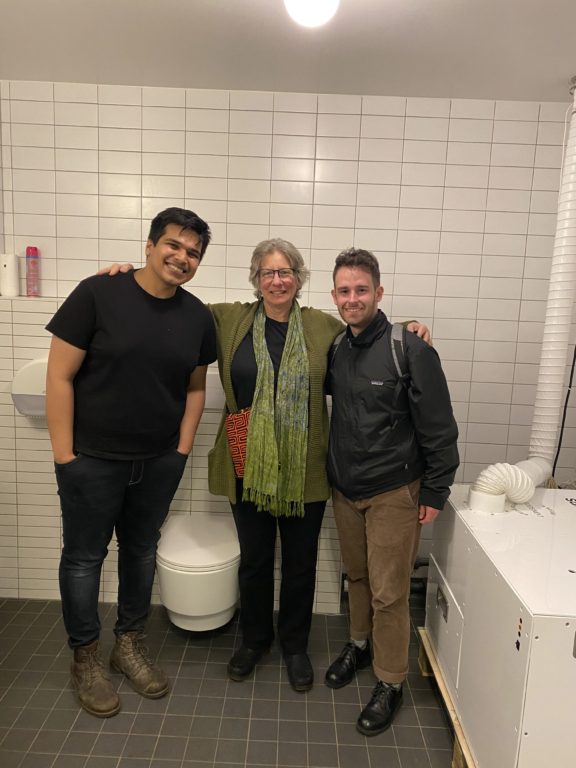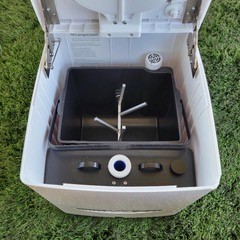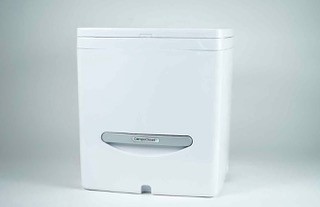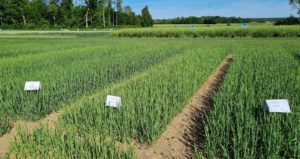
Author: Prithvi Simha
Dyllon and Caitlin at SLU as part of the August T Larsson Guest Researchership

We had many discussions and brainstorming sessions about urine treatment technologies and nutrient recycling, with a growing list of new things to investigate. They also got to meet new urine researchers and see the SLU lab and urine collection facilities. Soon, Dyllon will also travel with the rest of our group to Gotland where we are hosting a demo day, showcasing our urine recycling approach and toilets/companies that are enable this paradigm shift in wastewater treatment. As Dyllon says in his recent LinkedIn post, “the future of pee-cycling is indeed bright 😊”.
New JTI Grant will investigate removal of micropollutants from reclaimed water

Funding for a new project “On-farm biochar filters for removal of organic micropollutants from reclaimed water for agricultural irrigation” has been approved by the Swedish Agricultural Research Foundation. The main applicant is Oksana Golovko from the Department of Aquatic Sciences and Assessment at SLU, with co-applicants Prithvi Simha from our research group and the biochar producer Waila on Gotland. Together with their newly hired PhD student, Maximilian Tyka, and Researcher Alberto Celma, they will carry out this project over the next four years.
Abstract: The use of safely reclaimed water for agriculture irrigation is a promising solution to address water shortages, especially on Gotland. One primary concern is the introduction of organic micropollutants (OMPs), such as pharmaceuticals and other chemicals, into the agricultural ecosystem and food chain. OMPs can be potentially persistent, bioaccumulative, toxic and could harm human health if they are present in agricultural products. This project aims to develop techniques to remove OMPs from reclaimed water using biochar, so that it can be safely reused for agricultural irrigation of food crops. The objectives are to 1) identify the most relevant OMPs in reclaimed water, 2) assess the capacity of biochar prepared from different renewable feedstock for removal of OMPs, 3) evaluate the thermal degradation of OMPs during re-pyrolysis/regeneration of biochar, and 4) communicate the results with food industry stakeholders.
Demo Day “Urine to Fertiliser” on Gotland – come and attend!
SLU and Sanitation360 will be hosting “Demo Day – Urine to Fertilizer”. We are what we eat and what we eat is what we excrete. Urine contains 80% of the plant nutrients we consume. These nutrients can and should be re-used as fertilizer. If you would like to learn about how we can re-use the nutrients in our urine as fertilizer, come and attend. You will also have the opportunity to touch and sit on toilets that are enabling this to happen.
When: June 13th @ 16h00
Where: KULTURUM, Specksrum 6, 621 55 Visby, Gotland
Link to the LinkedIn page of the demo day: https://www.linkedin.com/events/demoday-urinetofertilizer7066764140874260480/
Link to the Facebook page of the demo day: fb.me/e/153OuqStl
Factors influencing the recovery of organic nitrogen from fresh human urine dosed with organic/inorganic acids and concentrated by evaporation in ambient conditions

Can we evaporate water from acidified fresh human urine to produce a solid fertiliser? Yes, we can! In our latest article in Science of the Total Environment (STOTEN), my colleagues (Anastasija Vasiljev, Dyllon Randall and Bjorn Vinneras) and I show how human urine can be treated to produce fertilisers with nutrient content similar to that of blended synthetic/mineral fertilisers sold on the market. In fact, we can produce a fully #biobased #urine #fertiliser containing more than 20% nitrogen by dosing fresh urine with organic acids and dehydrating it in ambient conditions. So dig into our article if you’re as fascinated by #urinechemistry as we are, because we also attempt to understand the factors that affect the recovery of nitrogen-containing organic compounds in urine.
Producing fertilisers from urine-derived nutrients is highly relevant in today’s context, where globally the increase in fertiliser prices is affecting food production and causing more global hunger. On the other hand, segregating urine at source and safely #recycling it also one “beyond the business as usual” approach to achieving the sustainable development goal on water and sanitation #SDG6, a goal whose targets we are in serious risk of not meeting by 2030.
We therefore hope to transfer results from our paper to exciting projects such as P2GreeN and REWAISE EU project where urine recycling systems are being piloted in real-world settings!
Funding from the Kamprad Foundation will help address issues with mineral precipitation in urine collection systems
 Håkan Jönsson and Prithvi Simha were very pleased to hear last week that the Kamprad Family Foundation decided to grant them #funding for a two-year project that will address issues with #precipitation of minerals in #sanitation systems that separately collect #urine. Together with Dyllon Randall (an August T Larsson Guest Researcher at Swedish University of Agricultural Sciences (SLU)), they will develop techniques for preventative maintenance/cleaning of toilets. They also plan to develop technologies that capture mineral precipitates at the toilet, thereby preventing their deposits along wastewater pipes. Much of the work in the project will be done in #collaboration with two housing associations in Stockholm, BRF Understenshöjden and BRF Gebers, where urine-separating toilets were installed more than 20 years ago!
Håkan Jönsson and Prithvi Simha were very pleased to hear last week that the Kamprad Family Foundation decided to grant them #funding for a two-year project that will address issues with #precipitation of minerals in #sanitation systems that separately collect #urine. Together with Dyllon Randall (an August T Larsson Guest Researcher at Swedish University of Agricultural Sciences (SLU)), they will develop techniques for preventative maintenance/cleaning of toilets. They also plan to develop technologies that capture mineral precipitates at the toilet, thereby preventing their deposits along wastewater pipes. Much of the work in the project will be done in #collaboration with two housing associations in Stockholm, BRF Understenshöjden and BRF Gebers, where urine-separating toilets were installed more than 20 years ago!
Rich Earth Institute/Brightwater Tools visits SLU

Kim Nace and Ryan Homeyer of the Rich Earth Institute/Brightwater Tools visited Prithvi at SLU last month during their European tour of organizations that research and implement source-separation and nutrient recovery. They met over lunch and had discussions on a wide range of urine-related topics – how we collect urine, how we treat urine using our technologies (urine dehydration/SLU and freeze concentration/Rich Earth), our spin-off companies (Sanitation360 and Brightwater Tools), and how we operate in different contexts (Sweden versus the US; where regulations, funding and support are all different). But more importantly, the discussions really showed how similar our organisations are. For instance, our motivation with creating the spin-off companies are similar (to channel funding back to our research institutes rather than to make profit). It seems that organisations and people working with urine recycling could achieve more by joining hands and collaborating. So we really look forward to continuing the dialogue with the folks at Rich Earth Institute/Brightwater Tools.
Visit from CompoCloset founders to discuss urine treatment
The co-founders of CompoCloset, Erica Pugh and Richard Peter, visited SLU to discuss ways in which source-separated urine can be treated on-site. They have developed a composting toilet, Cuddy, that is specifically designed for vanlife that fits in small places like vans, tiny homes, cabins, and boats. They had nice discussions with Prithvi about ways in which SLU, Sanitation360 and CompoCloset could work together; e.g., by integrating SLU/S360’s urine dehydration technology with the Cuddy toilet.


The Cuddy toilet. PC: Erica Pugh
Jenna talks about urine on the Zuloo pōōdcast
Jenna Senecal was interviewed for the Zuloo pōōdcast. While they often talk about the number two, poop, they were eager to learn about how urine can be used as a fertilizer while also limiting our impact on the environment. Welcome to their pōōdcast where they bring insightful news, impact stories and quirky humor to the important topic of sanitation (or lack thereof). Listen to it here or on the youtube clip below –
New JTI-funded project on removing micropollutants from dried urine fertiliser
 SLU has developed an innovative technology that converts human urine to high-quality solid fertiliser. On Gotland, we’ve also shown that urine can effectively fertilise barley, which can be processed further to produce beer. But there is concern about micropollutants that could be present in urine (e.g., pharmaceuticals). Through a three-year project and with funding from Stiftelsen Lantbruksforskning (Swedish farmers’ foundation for agricultural research), we aim to address this concern. First, we will do a baseline study to evaluate fate of micropollutants in the urine chain (fertiliser, barley & beer). Second, techniques will be developed to remove micropollutants so that only plant-essential nutrients are recycled back to farmland. Third, using social science methods and system dynamics modelling, support for recycling urine among food consumers will be assessed. Finally, all the evidence will be presented to stakeholders in the food industry.
SLU has developed an innovative technology that converts human urine to high-quality solid fertiliser. On Gotland, we’ve also shown that urine can effectively fertilise barley, which can be processed further to produce beer. But there is concern about micropollutants that could be present in urine (e.g., pharmaceuticals). Through a three-year project and with funding from Stiftelsen Lantbruksforskning (Swedish farmers’ foundation for agricultural research), we aim to address this concern. First, we will do a baseline study to evaluate fate of micropollutants in the urine chain (fertiliser, barley & beer). Second, techniques will be developed to remove micropollutants so that only plant-essential nutrients are recycled back to farmland. Third, using social science methods and system dynamics modelling, support for recycling urine among food consumers will be assessed. Finally, all the evidence will be presented to stakeholders in the food industry.
Contact: Prithvi Simha

